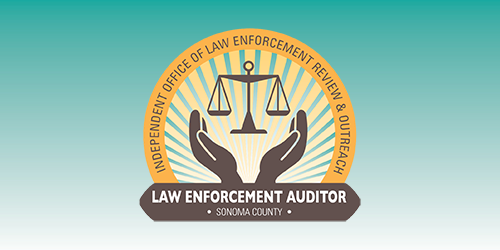
Sonoma County’s Measure P promises to expand civilian oversight of the Sonoma County Sheriff’s Office to increase transparency, accountability and public trust in local law enforcement during a time of increased skepticism among the county’s minorities and young residents.
Civilian oversight of the Sheriff’s Office has existed since 2013, after a deputy shot and killed 13-year-old Andy Lopez after mistaking his toy airsoft rifle for a real gun. But Measure P will compel the sheriff to disclose data around racial profiling and deputy-involved shootings, for example, and will provide the civilian oversight committee direct and independent access to evidence, whistleblower complaints and civil lawsuits — which can be used to determine whether criminal charges are necessary — as well as the authority to contact complainants and witnesses. Measure P would also give the committee subpoena power.
If passed, the measure will increase the committee’s annual operating budget to a value of 1% of the sheriff’s annual budget, although the money will come from the county’s General Fund. The sheriff’s budget will not change. This represents a three-fold increase from the committee’s current $570,000 annual budget to an annual figure near $1.8 million.
Jim Duffy, one of the initial members of the first civilian oversight committee, is clear about why voters should say yes to Measure P.
“There’s no supervision at the sheriff’s office,” he said. “They are not doing their job.”
According to Duffy and his colleague Caroline Bañuelos, Measure P will provide the committee both the structure and the teeth necessary to ensure the sheriff’s office is serving the people respectfully and fairly. The committee currently has a staff of two, despite asking the Board of Supervisors for four members when it was founded in 2013. If Measure P passes, the committee could hire a staff as large as seven.
“You can’t really be out in the community and be back in your office investigating without the staff to do it,” Bañuelos said.
There is already proof that a larger staff is necessary, said Jerry Threet, the oversight committee’s first director. Threet said that as more people became aware of the committee’s existence, he received more complaints about the sheriff’s office — and his investigations showed frequent problematic behavior from the sheriff’s department.
Measure P would also require the oversight committee’s director to be a certified Practitioner of Oversight by the National Association for Civilian Oversight of Law Enforcement, and that all committee members adhere to the association’s code of ethics.
“[NACOLE] provides training in areas such as investigating use of excessive force allegations, recommending changes to policy, and effective community engagement,” Threet said.
The measure almost didn’t make the ballot for lack of signatures, but in a sad irony, George Floyd’s death reenergized the campaign.
“The shelter-in-place order stopped us in our tracks. We kept pressuring the board but nothing was happening, and then George Floyd was murdered,” Threet said. “Suddenly lots of people started applying pressure, and the [County] Board [of Supervisors] put it on the ballot.”
Measure P supporters include both of Sonoma County’s delegates to the U.S. House of Representatives, Rep. Jared Huffman and Mike Thompson.
Measure P is also supported by the Sonoma County Democratic Party, NAACP, Sonoma County Black Coalition, Sonoma County Latina Democratic Club, National Organization for Women and Community Action Partnership of Sonoma County.
Priscilla Navas, 20, an SRJC communications major, is also a supporter.
“Granting [the civilian oversight committee] more power would help catch some of the issues our society is facing today,” she said. “And increasing transparency would create more trust between the community and law enforcement.”
Opponents include Sonoma County Sheriff Mark Essick, Sonoma County Law Enforcement Association President Damien Evans, Sonoma County Deputy Sheriff’s Association President Michael Vail and Sonoma County Farm Bureau President Jeff Carlton.
None of those opponents returned calls to The Oak Leaf to explain why they oppose the measure.
According to Threet, some opponents claim it is illegal for the Board of Supervisors to delegate its subpoena powers to another governing body, in this case, the civilian oversight board. But Threet says this argument is irrelevant because the California State Legislature passed and the governor signed AB1185, which says a board can give subpoena powers to a civilian oversight agency.
Another possible complaint is that Measure P will give civilians access to confidential criminal reports, but Theet said committee members are required to sign confidentiality agreements protecting the information. This is no different than the county’s Board of Supervisors having access to confidential records.
Measure P is on the ballot after two high-profile killings since 2013 at the hands of the sheriff’s office.
Andy Lopez was first, in 2013; his death caused outrage and the eventual formation of the county’s first civilian oversight committee, called the Community and Local Law Enforcement (CALLE) Task Force, which was tasked with making sheriff’s office reform recommendations to the Board of Supervisors.
CALLE’s recommendation was to form an independent audit agency and, two years later, the Board of Supervisors formed the Independent Office of Law Enforcement Review and Outreach (IOLERO), which had the ability to review and audit law enforcement investigations to identify flaws in internal investigations.
But even after this second iteration, the committee members knew it’d need to be updated again.
“We always knew we would need to rewrite it,” Duffy said. “Oversight is always an iterative process. So you are always going to be updating your ordinance over the years.”
Then, in November 2019, Sheriff’s Deputy David Blout killed handicapped 52-year-old David Glen after he pulled Glen from his car in a chokehold. Prior to Glen’s death, Blount was the subject of multiple civil suits. His misconduct cost the county hundreds of thousands of dollars.
“What measure P does is strengthen the requirements for cooperation from the sheriff, and it mandates access to all the information the office needs to perform its functions,” Threet said.




